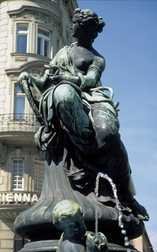
Providentia is the Roman personification of foresight, foreknowledge, forethought and providence (1: a looking to, or preparation for, the future. 2: the benevolent guidance of the Gods or nature). She was the personification of prophetic talents, a quality which enabled matriarchs and leaders to provide for their families and people by foreknowledge of the stars and the seasons. In Stoicism, a Greek school of philosophy, providence plays a major role, they believed that people should calmly accept divine will. Seneca, a Roman Stoic philosopher, formulates the belief in Providence in one of his dialogues as follows: man should believe "that Providence rules the world and that God cares for us." The Stoic school disagreed with those who believed that the world was ruled by blind fate and that the Gods didn't care about the people. They did not deny that a controlling power existed, but everything happens according to a benevolent divine plan. They called this power Providence. According to the Stoic emperor Marcus Aurelius, The Gods will everything that happens to man, and for that reason nothing that occurs can be considered evil. Seneca also wrote that it is proper to attribute the term Providence to the Gods.

Providentia is depicted on coins holding
an imperial baton and globe and she often holds a staff. Her coin inscriptions
include "PROVIDENTIAE AVG" The foresight of the emperor indicating
the emperor has divine abilities or is at least in the favor of the gods who
give him these portents. "PROVIDENTIAE CAES" which has a more symbolic
use. It was used when a son and an heir to the throne was born. This brilliant
piece of "foresight" by the emperor spared the people the unrest and
all too frequent civil wars over imperial succession in the future. Other inscriptions
include "PROVIDENTIAE DEORVM" the providence of the gods and "PROVIDENTIAE
SENATVS" the foresight of the senate.